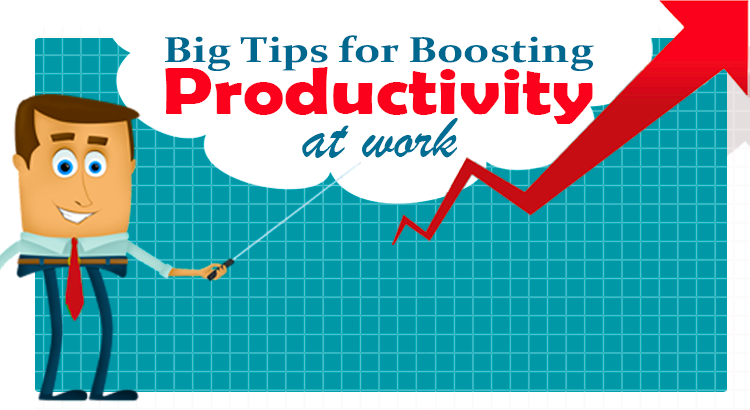“Personal productivity is a key differentiator between those who succeed in their chosen field and those who do not.” -Brian Tracy, best-selling author
Doing more, and faster with less effort is a real challenge. And that is what productivity is about – efficiency. Being productive takes a serious amount of determination and serious thought. So, to really double down and get the most out of your time, here are some big tips to boost productivity at work:
Strive for total well-being everyday.
It is important to create balance in your life by nurturing your whole person. To be at your best shape everyday, you must nurture your mental, emotional, and physical needs – the mind, the body, and the soul. A healthy and well-rounded individual is a happy and successful person.
Eat breakfast.
Breakfast is the most important meal of the day. Here, we do not say you eat breakfast, and breakfast alone. This is a reminder to take the most taken granted meal of each day – breakfast. Thought your mother was kidding when she say’s breakfast is important? Well, she’s right.
Studies show that eating a healthy breakfast can help improve your concentration, and mental and physical performance. Eating a breakfast that’s high in fiber and carbohydrates could help you feel less tired throughout the day, according to a 1999 study in the International Journal of Food Sciences and Nutrition. While eating high-energy foods for breakfast could help to boost short-term memory, according to a study of 319 teens (between ages 13 and 20) in the Journal of Adolescent Health.
Exercise.
Studies show that regular exercise can improve your mood, brainpower, and the quality of sleep. It increases your energy levels and provides relief from stress, enabling you to do more with lesser fatigue.
Exercise boosts the flow of nutrients and oxygen in your body, especially to your brain. The fitter you are, the faster you fire brain waves necessary for quick thinking. Regular exercise reduces the amount of stress hormones in the body, resulting in a slower heart rate, relaxed blood vessels, and lower blood pressure. Increased relaxation after exercise shows on your face with reduced muscle tension. Exercise, too, increases the levels of endorphins, the happy hormone, in your body. Thus, you become more resilient to depression.
Work wise, not hard.
Productivity is all about efficiency, we said. Perhaps it doesn’t matter if John dug the well with a shovel, and you did it with a backhoe. But it surely matters how fast you dug the pit, and how exhausted (or not) you are after completing the task. You do not have to be heroically exhausted to be considered productive, it’s just a matter of doing things, more things, wisely.
Prioritize.
Organize your time considering which tasks are most important, how much time you’ll need for each, and the best time of the day or week to complete them based on your body’s rhythms. A word of advice, plan your day when your mind is at its freshest, because planning takes tremendous mental effort.
Routinize.
We are great at executing patterns. That’s how our brains are wired. So, establish routines around the way you carry out regular tasks. This will make you more efficient and productive. A simple example would be setting email rules in automatically checking your inbox, or responding to emails or routine requests or inquiries.
Cluster.
The brain also learns and executes complex tasks by lumping together similar items. Schedule similar tasks back-to-back. If making phone calls is in your to-do list, you may make phone calls after phone calls, similarly, if you are set to send out emails, draft them all and send them all at the same time.
Unload.
Are thoughts, ideas, and errands keep popping up in your head? Write them down. Write everything that pops out in your head – your myriad thoughts, ideas, or errands. Focus on getting them all out and then make sense of them later on. By doing this brain dumping exercise, you effectively increase your focus.
Pace.
The more you rush, the more you err. So, pace yourself. If you are doing complex tasks like writing or strategizing or planning, take more breaks as this activities take a lot of mental effort, and your brain can only focus for a limited amount of time. Pause for a break, get out of your chair or desk, walk a little or socialise. Then, return to your work station with a fresher head.
Are you familiar with the Pomodoro Technique?
The Pomodoro Technique is a time management philosophy that aims to provide you with maximum focus and creative freshness, thereby allowing you to complete projects faster with less mental fatigue. It is done by budgeting your time into short increments and taking breaks periodically. You work for 25 minutes, and then take a 5 minute break after.
Each 25-minute work period is called a “pomodoro”, named after the Italian word for tomato (Francesco Cirillo used a kitchen timer shaped like a tomato as his personal timer, and thus the method’s name).
After four “pomodoros” have passed, (100 minutes of work time with 15 minutes of break time) you then take a 15-20 minute break.
Every time you finish a “pomodoro”, you mark your progress with an “X”, and note the number of times you had the impulse to procrastinate or switch gears to work on another task for each 25-minute chunk of time.
Decline.
Stick to your prioritise and your plans for the day. Too many unplanned commitments will slow you down (exhaust you big time). Learn to say “No” especially to commitments outside your job description or are not urgent in nature. Yes, saying ‘no’ is not easy for most of us so practice the art of declining.


